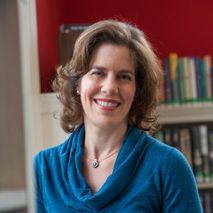
2024 Women's and Gender Studies Conference
Transgender Identity and Feminism
Presented by Wilkes University and King's College
April 8 & 9, 2024, Wilkes University
Presentation Proposals
We invite students, staff, faculty, and community members to participate in this year's annual Women's and Gender Studies Conference. Session types include research presentations, panel discussions, video screenings, and performance art (e.g., poetry slam, dramatic performance, dance). We also welcome presentations about service-learning, community service and travel abroad opportunities.
Proposals are due Feb. 26. Please use the form below to submit your proposal.
Keynote Speaker
Trans Rights and Women’s Rights: Feminism and the Fight for Gender Justice
Speaker: Dr. Heather Hewett
Monday, April 8, 7 p.m. | Jean and Paul Adams Commons
Free and open to the public - no registration required

Despite greater visibility and growing cultural acceptance over the last several decades, transgender and nonbinary people have been facing an onslaught of punitive legislation and an increase in violent attacks since 2021. Trans rights are both a feminist and a human rights issue, so it’s important to understand what’s happening and what’s at stake. This talk examines how we got here, how feminist and trans struggles for justice are interlinked, and how each one of us can work toward a world where liberation and justice is available to all people, regardless of who they are or where they live.
About Dr. Hewett
Heather Hewett is a professor and a feminist literary and cultural scholar who focuses on the 20th and 21st centuries. She co-edited the volume #MeToo and Literary Studies: Reading, Writing, and Teaching about Sexual Violence and Rape Culture (2021). Her opinion pieces, personal essays, and reviews have appeared in publications such as Boston Review, Inside Higher Ed, LIBER: A Feminist Review, and The Washington Post.
Dr. Hewett is an associate professor of Women’s, Gender, and Sexuality Studies and an affiliate of the Department of English at the State University of New York at New Paltz. Since fall 2022, she has been serving a two-year term as a program officer in Higher Education Initiatives at the American Council of Learned Societies. She earned a BA from Yale University and a PhD in English from the University of Wisconsin-Madison.
The Praxis of Gender on the Basis of Spirituality: The Case of Hijras in Pakistan
Muhammad Ali Awan, APPNA Institute of Public Health, Jinnah Sindh Medical University Karachi, Pakistan
This paper base of two parts: The one part of this paper indicates an identity construction process of hijra and the second part of the paper state about the legitimization of spiritual being of hijras and performance of feminine gender through the myths. In the first part, I argue that hijra identity is a representation of socio-cultural knowledge, which legitimize hijra's role as a spiritual being. However, in its nature, hijra identity is a prescribe identity and imposed by the society upon gender variant children. This prescribe identity revolve around the self-image of gender variant children as of a woman. In the process of identity development, gender variant children face a situation of violence and discrimination. It also makes them vulnerable to sexual abuse, which strengthen their sense of self as of a woman and influence to develop sexual attraction towards males. These all circumstance puts gender variant children into the situation of social isolation and they receive a label of hijra by the society. Therefore, they coordinate with hijra community, where they authenticate their sense of self as of a woman and adopt hijra identity. The second part of this article state that hijra creates their relationship with the divine through the medium of the soul and legitimize their performance of feminine gender with the belief that they have 'feminine soul'. They narrate this conceptualization of spiritual being through the myths, which are common in hijra community and performed in mainstream society through ritualistic practices. The relation between self of a person and divine is also evident from the mystic poetry and Sufi tradition. However, traditional Islamic scholars do not accept such kind of version of the relationship between creator and creature. Instead of that, traditional Islamic scholars, in case of hijras, emphasize about the morphology of sexual organ instead of a sense of self as of woman or gender of soul. Therefore, the performer of such gender variant identity is blameworthy. The members of the hijra community try to cope such situation through performance of prayer in the masculine gender and develop narration that God created them in male body therefore they must appear front of God in the same. The recent Fatwa about the transgender marriage is considered as a breakthrough at least in term of acceptability in the social sphere and safeguarding them from the hate crime. However, I am with the view that this Fatwa somehow replication of previous Islamic practices and there is nothing new, except creation of confusion by using word transgender. Because, the fatwa does not cover dynamics of transgender identity and it is contradictory to apply this term on hijra with baggage of Islamic law. Therefore, I conclude, spirituality provide spaces for the expression of the self, even it goes against the norms of the society or challenge traditional religious practices. The performance of feminine gender in the hijra identity is reflection of the same self which one side create link between creator and creation while other side make them vulnerable for the sharia punishment.